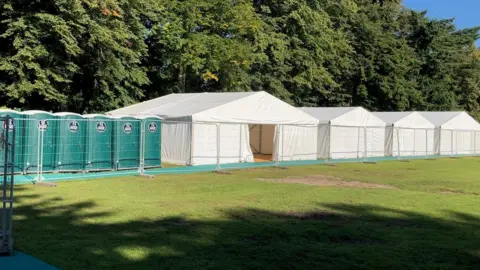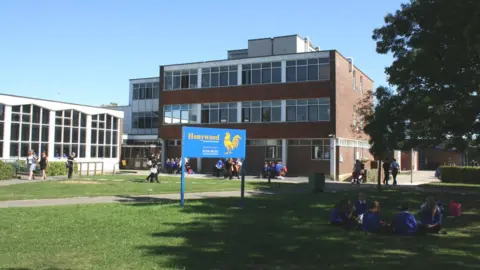Essex school closed by concrete crisis appeals for marquees
 Carmel Jane Studio Ltd
Carmel Jane Studio LtdA secondary school head teacher has appealed for help sourcing marquees to teach children outside, in response to the ongoing concrete crisis.
Honywood School in Coggeshall, Essex, was told half the site, including 22 classrooms, must shut because of reinforced autoclaved aeriated concrete (RAAC) in its buildings.
About 50 schools in the county have been affected.
James Saunders said staff were looking at ways to get all pupils back on site.
"Can we source some marquees to get people out on the field while the weather is nice and do some teaching there?" he told the BBC.
"If anyone is listening or reading this and they want to get in contact with me, I'd be very happy for them to."

 Honywood School
Honywood SchoolHonywood parents have been told only year seven and year 11 pupils would be taught in person during the first two weeks of term, while other year groups were being provided with tablets ready for remote learning from 14 September.
Mr Saunders said the Saffron Academy Trust, which runs the school, was working with the Department for Education (DfE) to find temporary classroom units and was arranging structural work to address the RAAC.
He admitted he was unlikely to welcome all 800 pupils back on school grounds before 2 October.
"The children will suffer the most because I've had my shot at school, so have our parents, we're all disrupted, but our children, this is their time at school - we really need to minimise that disruption, because in a way, it echoes the same situation we had with Covid," he said.
"I've seen the knock-on effect that has on mental health in the long term, so we have got to get this right now because otherwise we will be picking up issues with them in years to come."
Reinforced autoclaved aerated concrete (RAAC) was used in public buildings between the 1960s and 1980s and has an expected lifespan of 30 years.
The DfE said it had been aware of problems with RAAC since 1994 and advised schools in 2018 to implement "adequate contingencies".
On Monday, Prime Minister Rishi Sunak defended his actions while serving as chancellor in 2021, after a former civil servant claimed the Treasury was responsible for scaling back the school rebuild project.

Follow East of England news on Facebook, Instagram and Twitter. Got a story? Email [email protected] or WhatsApp us on 0800 169 1830
